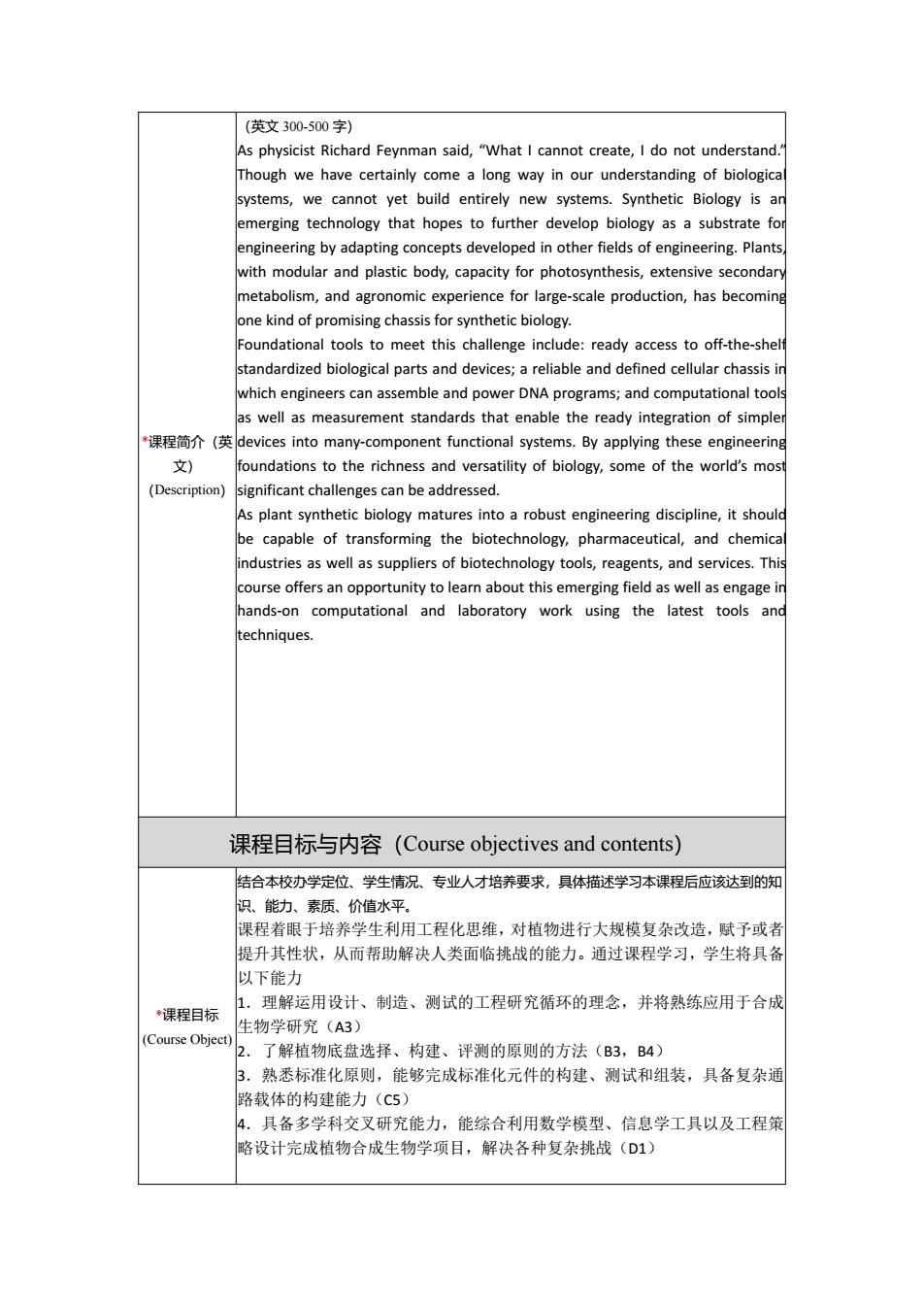正在加载图片...

(英文300-500字) As physicist Richard Feynman said,What I cannot create,I do not understand Though we have certainly come a long way in our understanding of biologic systems,we cannot yet build entirely new systems.Synthetic Biology is ar emerging technology that hopes to further develop biology as a substrate fo engineering by adapting concepts developed in other fields of engineering.Plants with modular and plastic body,capacity for photosynthesis,extensive condar metabolism,and agronomic experience for large-cale production,has becomin one kind of promising chassis for synthetic biology. Foundational tools to meet this challenge include:ready access to off-the-she standardized biological parts and devices:a reliable and defined cellular chassis i which engineers can assemble and power DNA programs;and computational too well as measurement standards tha 课程简介(英 devices into many-component functional systems.By applying these engineerin 文) foundations to the richness and versatility of biology,some of the world's mos (Description)significant challenges can be addressed. As plant synthetic biology matures into a robust engineering discipline.it shoule 6。 apable of transfor ming the biotecnology. pharmac utical,and cher ustries as well as suppliers of biotechnology too,reagents,and services.This course offers an opportunity to learn about this emerging field as well as engage ir hands-on computational and laboratory work using the latest tools and techniques. 课程目标与内容(Course objectives and contents) 结合本校办学定位、学生情况、专业人才培养要求,具体描述学习本课程后应该达到的蜘 、质价值大平 深程名眼于将学生利用工程化思维,对植物进行大发模复杂改造,欧予减 提升其性状,从而帮助解决人类面临挑战的能力。通过课程学习,学生将具备 以下能力 课程目标 1.理解运用设计、制造、测试的工程研究循环的理念,并将熟练应用于合成 生物学研究《△3) (Course Object). 了解植物底盘选择、构建、评测的原则的方法(B3,B4) 3. 熟悉标准化原则,能够完成标准化元件的构建、测试和组装,具备复杂通 路载体的构建能力(C5) 4。具备多学科交叉研究能力,能综合利用数学模型、信息学工具以及工程策 略设计完成植物合成生物学项目,解决各种复杂挑战(D1) *课程简介(英 文) (Description) (英文 300-500 字) As physicist Richard Feynman said, “What I cannot create, I do not understand.” Though we have certainly come a long way in our understanding of biological systems, we cannot yet build entirely new systems. Synthetic Biology is an emerging technology that hopes to further develop biology as a substrate for engineering by adapting concepts developed in other fields of engineering. Plants, with modular and plastic body, capacity for photosynthesis, extensive secondary metabolism, and agronomic experience for large‐scale production, has becoming one kind of promising chassis for synthetic biology. Foundational tools to meet this challenge include: ready access to off‐the‐shelf standardized biological parts and devices; a reliable and defined cellular chassis in which engineers can assemble and power DNA programs; and computational tools as well as measurement standards that enable the ready integration of simpler devices into many‐component functional systems. By applying these engineering foundations to the richness and versatility of biology, some of the world’s most significant challenges can be addressed. As plant synthetic biology matures into a robust engineering discipline, it should be capable of transforming the biotechnology, pharmaceutical, and chemical industries as well as suppliers of biotechnology tools, reagents, and services. This course offers an opportunity to learn about this emerging field as well as engage in hands‐on computational and laboratory work using the latest tools and techniques. 课程目标与内容(Course objectives and contents) *课程目标 (Course Object) 结合本校办学定位、学生情况、专业人才培养要求,具体描述学习本课程后应该达到的知 识、能力、素质、价值水平。 课程着眼于培养学生利用工程化思维,对植物进行大规模复杂改造,赋予或者 提升其性状,从而帮助解决人类面临挑战的能力。通过课程学习,学生将具备 以下能力 1.理解运用设计、制造、测试的工程研究循环的理念,并将熟练应用于合成 生物学研究(A3) 2.了解植物底盘选择、构建、评测的原则的方法(B3,B4) 3.熟悉标准化原则,能够完成标准化元件的构建、测试和组装,具备复杂通 路载体的构建能力(C5) 4.具备多学科交叉研究能力,能综合利用数学模型、信息学工具以及工程策 略设计完成植物合成生物学项目,解决各种复杂挑战(D1)